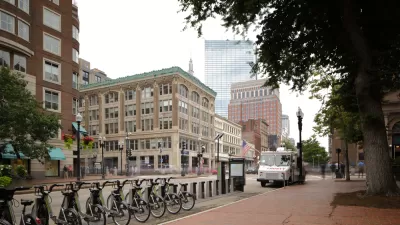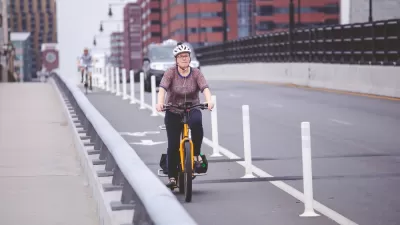Bikeshare programs have met varied degrees of success in North America. Boston’s Hubway, the result of a public-private partnership, is turning a profit entering its fourth year. What's its secret?
Martine Powers reports for the Boston Globe on the success of Hubway, the city of Boston’s bikeshare system. After shutting down for the winter, “Hubway opened for its fourth season with a rosy financial prognosis, a fresh contract between the City of Boston and bike-share operators, an expectation that the system will continue turning a profit, and plans for 10 new stations.”
Powers contrasts the experience of bikeshare programs in Montreal and New York City, both of which have encountered financial trouble in 2014.
The success of bikeshares programs like Boston’s might lie in its modest and incremental goals. To make this point, Powers quotes Mia Birk, Hubway Bike Share vice president: “Bike share systems in Boston, Denver, Chicago, Minneapolis, and Washington, D.C., all of which started relatively small and relied on public sector funds, were able to launch with success, iron out kinks, stabilize, and expand quickly.”
A few more details on the funding and operating structure of Hubway: “Previously Boston divided the costs of operating the system 50-50 with Alta Bicycle Share, the contractor that operates and maintains the system’s bikes, stations, software, and memberships. Boston uses public grant money, along with private sponsorships, to pay the city’s share without dipping into municipal coffers — and up until now, Alta and Boston have split the profits in half.”
FULL STORY: Public-private funding for Hubway paying off

Maui's Vacation Rental Debate Turns Ugly
Verbal attacks, misinformation campaigns and fistfights plague a high-stakes debate to convert thousands of vacation rentals into long-term housing.

Planetizen Federal Action Tracker
A weekly monitor of how Trump’s orders and actions are impacting planners and planning in America.

San Francisco Suspends Traffic Calming Amidst Record Deaths
Citing “a challenging fiscal landscape,” the city will cease the program on the heels of 42 traffic deaths, including 24 pedestrians.

Aging NYC Subway Cars No Match for Extreme Heat
The MTA receives thousands of complaints about broken air conditioning on subway cars each summer.

Cleveland to Boost Bike Safety With New Bike Lanes, School Programs
The program, using curriculum created by Cleveland Bikes, is part of a broader effort to improve safety along school routes.

Florida Home Insurers Disproportionately Dropping Low-Income Households
Non-renewal rates are highest in inland counties, not the coastal areas most immediately vulnerable to storms.
Urban Design for Planners 1: Software Tools
This six-course series explores essential urban design concepts using open source software and equips planners with the tools they need to participate fully in the urban design process.
Planning for Universal Design
Learn the tools for implementing Universal Design in planning regulations.
Gallatin County Department of Planning & Community Development
Heyer Gruel & Associates PA
JM Goldson LLC
City of Camden Redevelopment Agency
City of Astoria
Transportation Research & Education Center (TREC) at Portland State University
Jefferson Parish Government
Camden Redevelopment Agency
City of Claremont




























